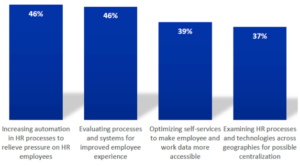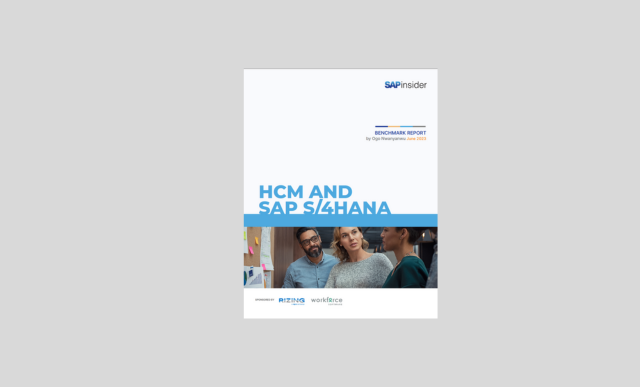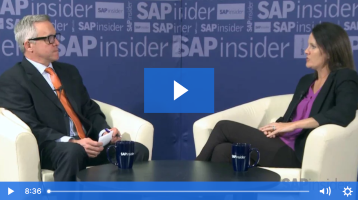HR Technology Adoption Creates Difficult Balance for HR Leaders
Meet the Authors
Key Takeaways
⇨ The global pandemic fast-tracked HR technology adoption, empowering businesses to enhance efficiency and productivity via automation.
⇨ HR professionals face a growing impact from automation breakthroughs in core HR operations, as seen through job cuts at leading software and technology firms.
⇨ To achieve greater efficiency and enhanced employee experiences, SAPinsider organizations must strike a delicate balance between automation and human touch in modernizing HR processes. This transformation is exemplified by SAP's evolution from Human Capital Management (HCM) to Human Experience Management (HXM).
In recent weeks, Meta’s CEO Mark Zuckerberg announced the company’s decision to reduce its workforce by 10,000 employees, following a previous reduction of 11,000 employees in November 2022. Zuckerberg also designated 2023 as the “year of efficiency,” acknowledging recent layoffs are a part of this initiative. As organizations seek to boost efficiency, HR leaders face the challenge of balancing automation and human involvement in HR processes.
HR Technology Adoption and the Drive for Efficiency
The SAPinsider HR Technology State of the Market benchmark report indicates that 62% of organizations accelerated their adoption of HR technology during the pandemic. As a result, digital transformation and automation have become top priorities, with 82% of survey participants considering increased worker productivity as a crucial aspect of their HR technology strategies.
However, as efficiency gains can reduce the need for full-time employees in HR teams, HR leaders face complex decisions. A staggering 77% of survey respondents identified the ability to downsize HR teams as an essential requirement for their HR technology strategies.
Explore related questions
The Impact of Automation on HR Professionals
A 365 Data Science report reveals that HR personnel account for 28% of total layoffs in the software technology sector since the fourth quarter of 2022. Companies like Microsoft, Amazon, and Meta have seen significant reductions in their HR teams as HR platforms like SAP SuccessFactors automate numerous routine HR procedures, including recruiting, onboarding, and offboarding. It appears HR technology and automation are taking center stage, with leading software companies exhibiting the following trends:
- Microsoft: HR personnel account for 39.4% of total layoffs
- Amazon: HR personnel account for 37.4% of total layoffs
- Meta: HR personnel account for 29.8% of total layoffs
As the role of HR professionals evolves, it’s crucial to find the right balance between leveraging technology and retaining the human touch in HR processes. Additionally, HR professionals must adapt to modern working methods and develop data analysis, strategic planning, and employee engagement skills.
Optimizing Automation in HR Processes
To maximize automation opportunities, organizations must carefully evaluate which processes are suitable for automation and which require human involvement. A thorough evaluation of HR operations can help organizations capitalize on the advantages of automation and human contributions where necessary. This strategy aligns with the above study’s top drivers (Figure 1) and will be essential in striking the right balance between automation and human involvement.

The Evolution from HCM to HXM: SAP’s Vision for the Future of HR
SAP is at the forefront of shaping the future of HR technology. Its transition from HCM to HXM highlights the potential for greater efficiency and a more positive employee experience. SAP SuccessFactors forms the core of SAP’s HXM offering, enabling organizations to streamline HR workflows with extensive features, including recruiting, onboarding, performance evaluation, goal setting, compensation management, time tracking, time off administration, and payroll processing. The SAP SuccessFactors HXM suite supports succession planning, career development, and training options.
SAP SuccessFactors HXM Suite offers a comprehensive approach to optimizing employee experiences by connecting core HR and payroll systems with talent management capabilities, sales performance oversight, and people analytics insights—designed to help organizations generate meaningful employee outcomes.
As organizations continue integrating automated systems into their business operations, recognizing which tasks require more complex analysis beyond machine capabilities is essential. By striking the right balance between automation and human involvement in HR processes, organizations can ensure a future-ready HR function that drives efficiency and fosters a positive employee experience.
Please take our HCM and SAP S/4HANA survey to share your insights to see where you stand against your peers.








